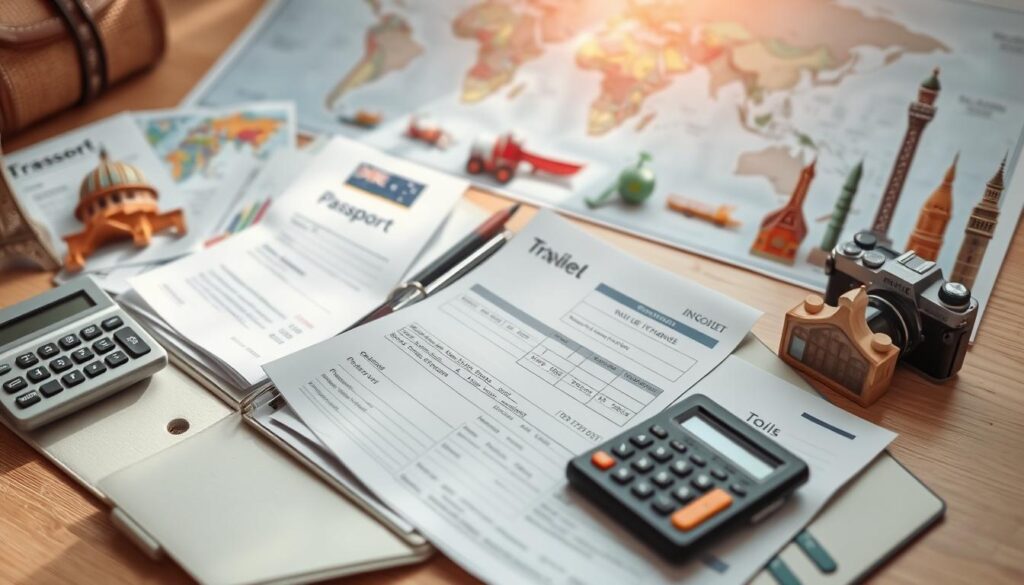Are you tired of unexpected travel expenses draining your wallet? Learning about travel fee settlement can change how you handle money while traveling. It’s all about knowing how to deal with travel expense reimbursement.
Travelers today face complex fee structures that can really affect their budget. Knowing how to handle travel fee settlement can save you a lot of money each year. From airline fees to hotel costs, every part of your trip might have hidden expenses.
Getting reimbursed for travel expenses is more than just keeping receipts. It’s a detailed process that needs careful planning and financial management. Whether you travel for work or fun, learning these skills can make your trips cheaper and less stressful.
This guide will show you how to understand, calculate, and reduce travel fees. You’ll discover tips to spend less on travel and get more back when you’re reimbursed.
Table of Contents
What is Travel Fee Settlement?
Traveling can be tough, and knowing how to handle expenses is key. It’s important to understand how to get reimbursed for your travel costs. This way, you can manage your money better and get the right amount back.
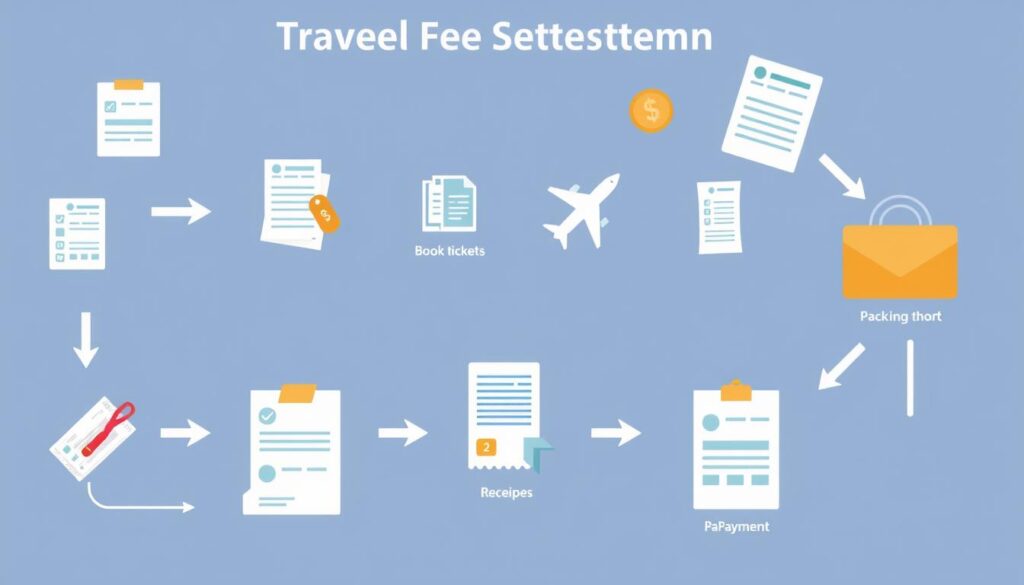
Travel fee settlement helps you deal with all your travel costs. You need to document and submit your expenses. This way, you can get a refund from airlines, employers, or travel companies.
Definition of Travel Fee Settlement
Travel fee settlement is all about:
- Tracking your travel expenses
- Gathering the right documents
- Submitting detailed reports
- Following up with providers or employers
Importance of Understanding Travel Fees
“Knowing about travel fees can save you a lot of money and avoid surprises.”
Learning about travel reimbursement has many benefits:
- Get the most out of refunds
- Save on unnecessary costs
- Make managing your travel money easier
Knowing how to handle travel fee settlements can really help with your expenses. By understanding the terms of use for travel services and keeping good records, you’ll manage your money well.
Pro tip: Always keep both digital and physical copies of your receipts and expense reports. This will help support your refund claims.
Types of Travel Fees You Might Encounter
Traveling can be tricky when it comes to money. Knowing about different fees helps you plan better and handle claims more easily. Every trip has its own costs that can change your budget.
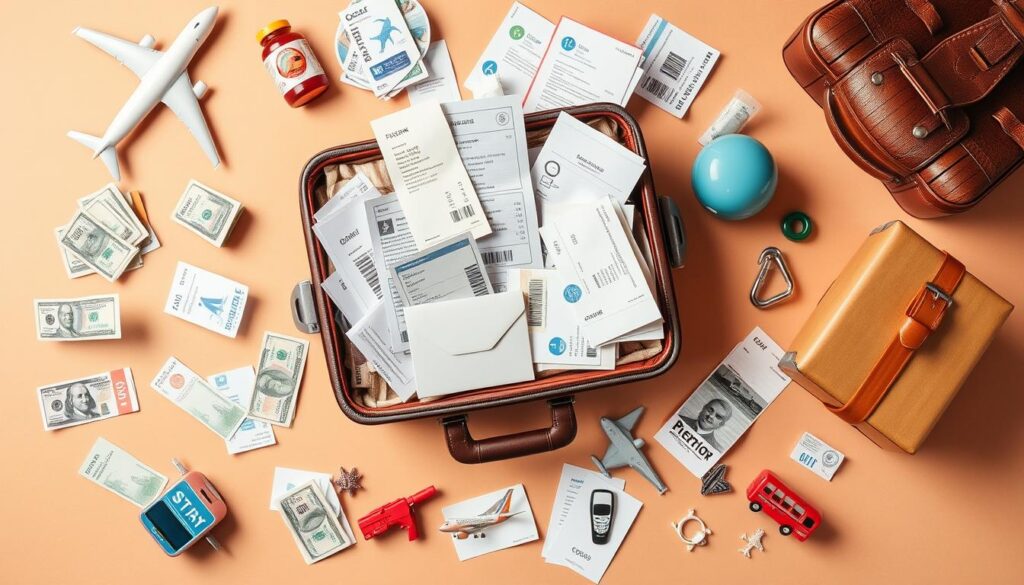
Travelers meet many fee types that affect their trip costs. Let’s look at the most common ones:
Airline Fees
Airlines charge many fees that can add up fast:
- Baggage charges
- Seat selection fees
- In-flight service expenses
- Change and cancellation penalties
Accommodation Fees
Hotels and rentals have extra costs beyond the main price:
- Resort fees
- Cleaning charges
- Parking expenses
- Security deposits
Transportation Fees
Traveling around has its own costs:
- Car rental rates
- Public transit costs
- Ride-sharing charges
- Airport shuttle services
Miscellaneous Travel Fees
Some costs might surprise you:
- Travel insurance
- Visa processing fees
- Currency exchange charges
- Equipment rental costs
“Knowing your potential expenses is the first step to effective travel claims settlement.” – Travel Finance Expert
| Fee Category | Average Cost Range | Potential Savings Strategy |
|---|---|---|
| Airline Fees | $25-$200 | Book early, pack light |
| Accommodation | $50-$300/night | Compare prices, use loyalty programs |
| Transportation | $30-$150/day | Use public transit, compare rental rates |
Pro tip: Always budget an extra 10-20% for unexpected travel expenses to ensure smooth travel claims settlement.
How to Calculate Your Travel Fees
Figuring out travel fees can be tricky. It’s important to track your spending for travel reimbursement claims and budgeting. Knowing how to split and review your travel costs helps manage your money better.
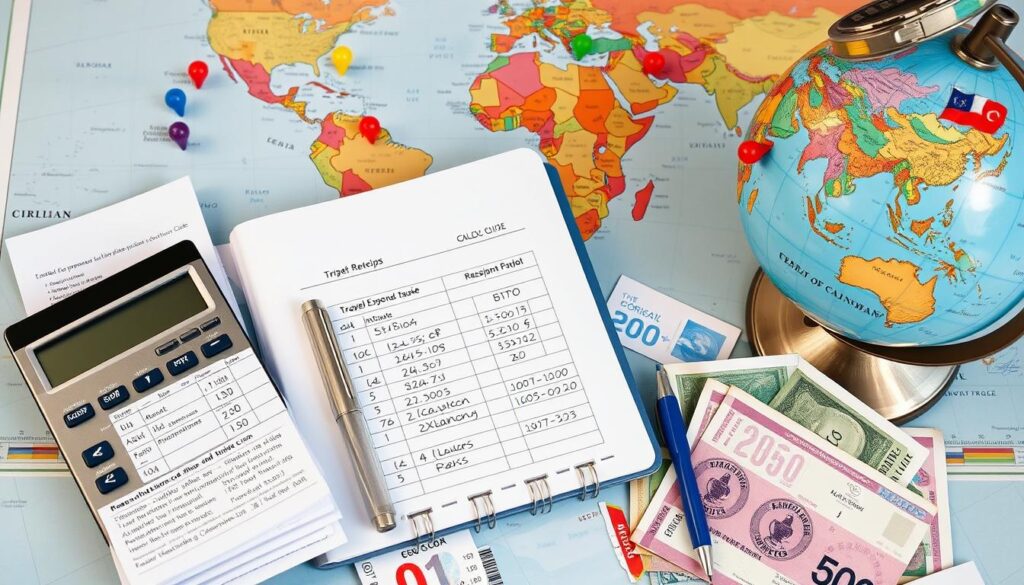
Gathering Necessary Documents
Begin by gathering all important financial papers. You’ll need:
- Airline ticket receipts
- Hotel booking confirmations
- Transportation expense records
- Meal and incidental expense receipts
- Credit card statements
Itemizing Your Travel Expenses
Sort your expenses into clear groups to make your claim easier. Make a detailed list that includes:
- Transportation costs
- Accommodation expenses
- Meal and entertainment expenses
- Miscellaneous charges
“Precise documentation is the key to successful travel expense management.”
Using Online Calculators
Use digital tools to make your refund process smoother. Online calculators can help you:
- Quickly add up your expenses
- Convert foreign currency
- Track per diem rates
- Make expense reports
Pro tip: Always keep both digital and physical copies of your receipts. This ensures accurate tracking and possible reimbursement.
Tips for Minimizing Travel Fees
Traveling can be pricey, but smart planning can cut costs. Knowing how to save on travel can greatly reduce your expenses.

Smart travelers plan ahead to save money. Here are some effective ways to lower your travel costs:
Book in Advance
Booking early can save you a lot. Airlines and hotels give big discounts for early bookings. Try these tips:
- Book flights 6-8 weeks before for domestic trips
- Book international flights 3-4 months early
- Look for early bird hotel deals
Compare Prices Effectively
Comparing prices is key to saving money. Use different sites to find the best deals:
| Platform | Best For | Potential Savings |
|---|---|---|
| Skyscanner | Flight Comparisons | Up to 40% |
| Booking.com | Hotel Rates | Up to 35% |
| Kayak | Overall Travel Packages | Up to 45% |
Utilize Travel Reward Programs
Travel reward programs can save you a lot. Loyalty points and miles can help a lot:
- Join airline and hotel loyalty programs
- Use credit cards with travel rewards
- Build points with smart spending
“The best travelers don’t just book trips—they strategically plan to minimize costs.”
Understanding Airline Fees
Dealing with airline fees can be tricky. Airlines have complex fee systems that can really affect your travel costs. Knowing these fees can help you save money on your next trip.
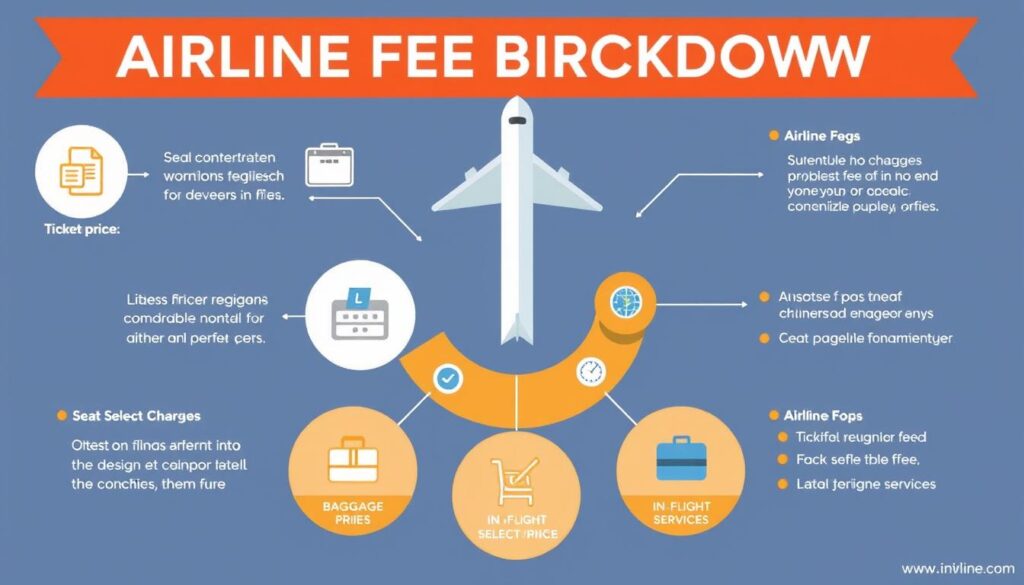
When you plan your trip, it’s important to know about different fees. Tracking your travel fee settlement means paying attention to many types of charges.
Baggage Fees Explained
Baggage fees vary a lot between airlines. They can add up quickly. Most airlines charge for checked bags, with fees from $30 to $60 per bag. Some things to keep in mind include:
- First bag usually costs less than second or third bags
- Weight and size limits can lead to extra fees
- Some credit cards and loyalty programs offer free checked bags
Change and Cancellation Fees
Airlines charge for changing or canceling flights. These fees can be high, from $100 to $300. Flexible tickets usually have better change options.
Seat Selection Charges
Seat selection is another way airlines make money. Prices range from $10 to $50 per seat, based on where the seat is and how long the flight is. If you’re watching your budget, you might choose a seat during check-in for free.
“Understanding airline fees is key to managing your travel expenses effectively.” – Travel Expert
Accommodation Fees Explained
Travelers often find it hard to deal with accommodation fees. Knowing what you’ll pay helps you plan better and avoid surprises. This way, you can manage your travel cost refund more easily.
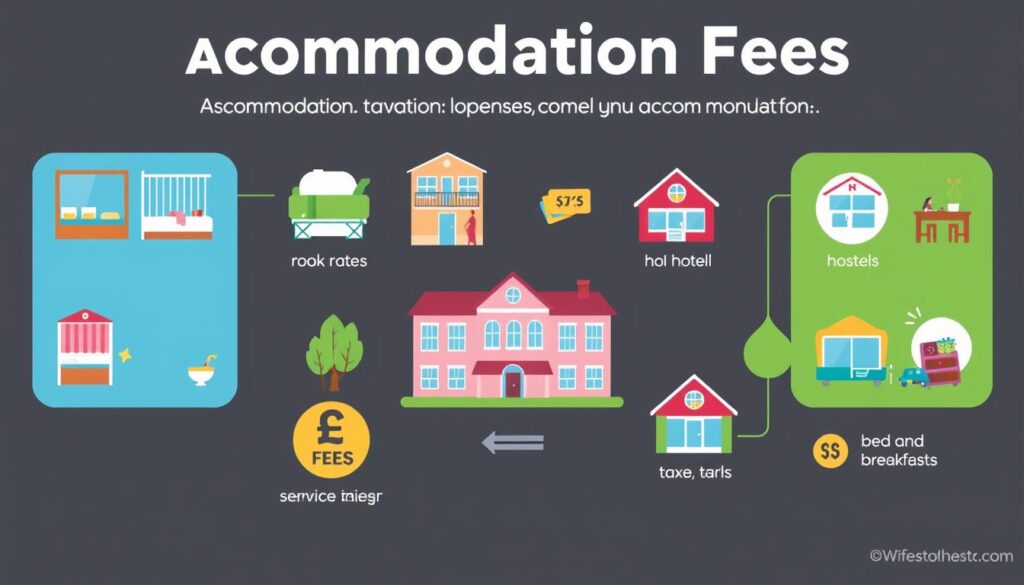
When you plan your trip, think about all the extra fees. These can add up quickly. They include things like cleaning fees and resort fees.
Breaking Down Cleaning Fees
Cleaning fees are now common, mainly in short-term rentals. They cover the cost of getting the room ready for the next guest. Here’s what you need to know:
- They usually cost between $25 and $100 per stay
- Most of the time, they’re not refundable
- They can change based on the size of the property and where it is
Understanding Resort Fees
Resort fees can really add up. They’re mandatory and often include things like wi-fi, pool access, and gym usage.
| Fee Type | Average Cost | Typical Inclusions |
|---|---|---|
| Resort Fee | $15 – $50 per night | Wi-Fi, Pool, Fitness Center |
| Cleaning Fee | $25 – $100 per stay | Property Sanitation |
Security Deposits Explained
Security deposits help protect the property. Expect to give a refundable amount that ranges from $100 to $500, depending on the place.
Pro Tip: Always photograph the accommodation’s condition upon arrival to ensure a full security deposit return.
Knowing about these fees helps you plan your budget better. This makes your travel reimbursement process smoother.
Transportation Fees Breakdown
Traveling means using different ways to get around, each with its own costs. Knowing about these fees is key for settling travel claims and managing expenses. How well you handle these costs can greatly affect your travel budget.
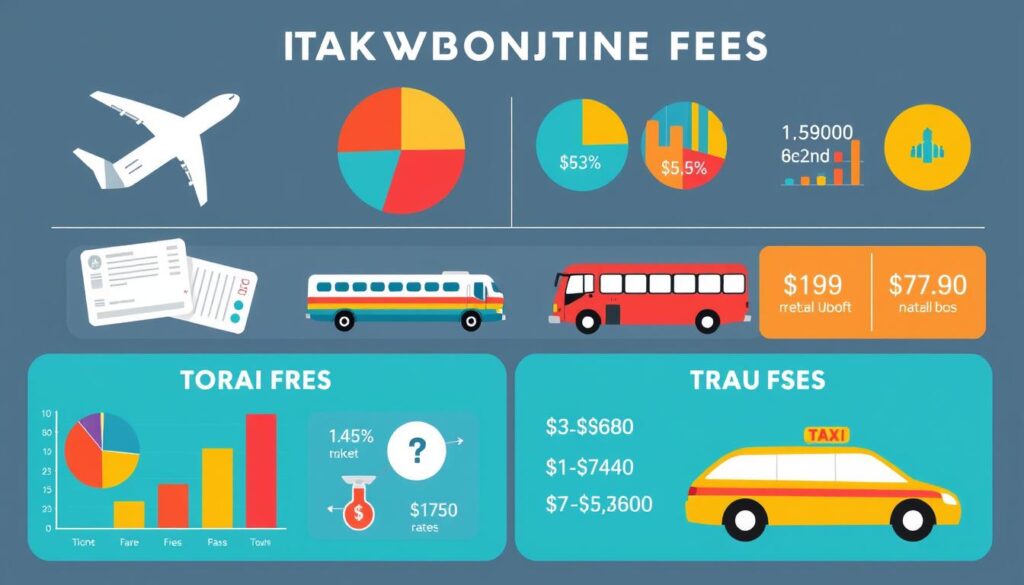
When planning your trip, you’ll face various transportation costs. It’s important to think about these fees carefully. Here are the main types of transportation fees you might see on your travels.
Car Rental Fees
Car rental costs are more than just the daily rate. You’ll need to consider several other expenses:
- Base rental rate
- Insurance options
- Fuel policies
- Additional equipment charges
Public Transportation Costs
Public transit is a cost-effective way to travel. Smart travelers can save by:
- Purchasing multi-day passes
- Using tourist transportation cards
- Looking for local discounts
Ride-Sharing Charges
Ride-sharing services offer flexible travel with prices that change. Costs are influenced by:
- Time of day
- Distance traveled
- Current demand
- Service type chosen
| Transportation Type | Average Cost Range | Cost Optimization Strategy |
|---|---|---|
| Car Rental | $35-$70 per day | Book in advance, compare rates |
| Public Transit | $2-$10 per trip | Use daily/weekly passes |
| Ride-Sharing | $10-$45 per ride | Compare multiple services |
“Smart travelers plan their transportation expenses before hitting the road.” – Travel Budget Expert
To master travel expense management, you need to plan ahead and know about possible fees. Understanding these costs helps you make smart choices that save your travel budget.
Travel Fee Settlement Process Overview
Travel reimbursement claims can be tricky for many. Knowing the steps for travel refund reconciliation is key to getting what you’re owed.
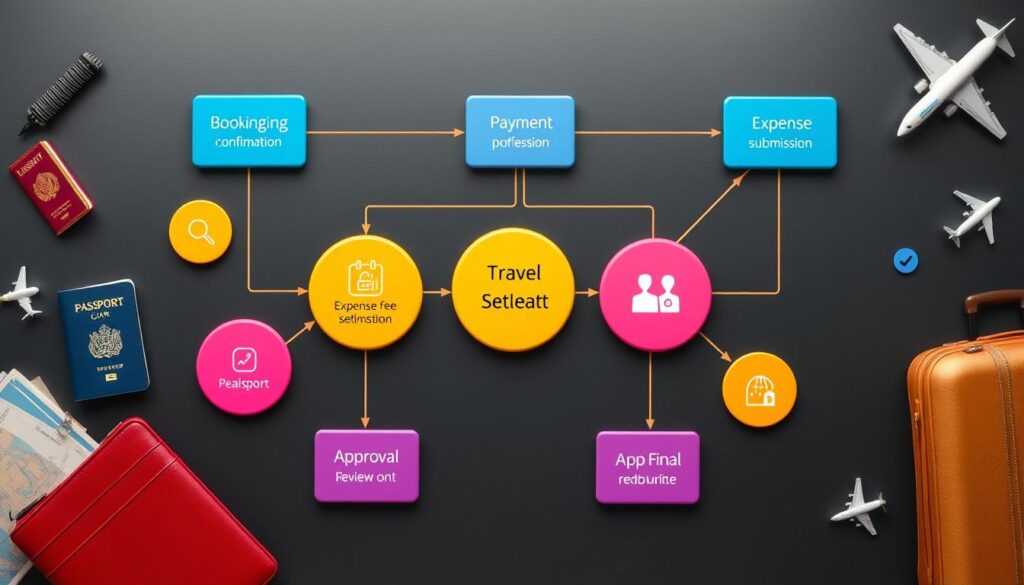
The process has three main stages. Each one needs your attention and the right documents.
Initial Submission of Fees
Your claim starts with detailed documentation. Collect all receipts, invoices, and expense records to back your claim.
- Collect digital and physical receipts
- Organize expenses by category
- Ensure all documentation is clear and legible
Review by the Travel Provider
After you submit, the travel provider reviews your claim. This can take a few days to weeks, depending on your claim’s complexity.
| Review Stage | Typical Duration | Key Actions |
|---|---|---|
| Initial Document Check | 3-5 business days | Verify receipt authenticity |
| Detailed Expense Audit | 1-2 weeks | Validate expense categories |
Approval and Reimbursement
After approval, you’ll get your money back. This can be through direct deposit, credit to your account, or a check.
“Accurate documentation is the key to successful travel fee settlement.” – Travel Expense Expert
Keep track of your claim and stay in touch with the travel provider. This helps the process go smoothly.
Common Mistakes in Travel Fee Settlement
Travel fee reimbursement can be tricky. Many travelers face challenges that make settling travel costs hard. Knowing these common mistakes can help you avoid them and get your money back smoothly.
Travelers often make mistakes that can stop their reimbursement efforts. Here are the most common ones:
Incomplete Documentation Challenges
Good documentation is key to successful travel cost settlement. Without it, you might face:
- Rejected reimbursement claims
- Delayed payment processing
- Potential financial losses
Deadline Disaster
Missing deadlines can ruin your reimbursement chances. Most companies have strict rules for when to submit expenses.
| Deadline Type | Typical Timeframe | Consequences |
|---|---|---|
| Initial Submission | 30-60 days after travel | Claim may be rejected |
| Final Processing | 90 days from submission | Potential financial loss |
Policy Ignorance
Every travel provider has its own rules. Ignoring these can lead to automatic claim denial. Always:
- Read travel reimbursement guidelines carefully
- Understand specific documentation requirements
- Verify submission procedures
“Knowing the rules of travel fee settlement is your best defense against financial complications.” – Travel Expense Management Expert
Avoiding these mistakes can make your travel cost settlement easier. This way, you have a better chance of getting your money back fully.
The Role of Travel Insurance
When planning your travels, understanding travel fee settlement is key. Travel insurance acts as a safety net for unexpected costs and financial challenges.
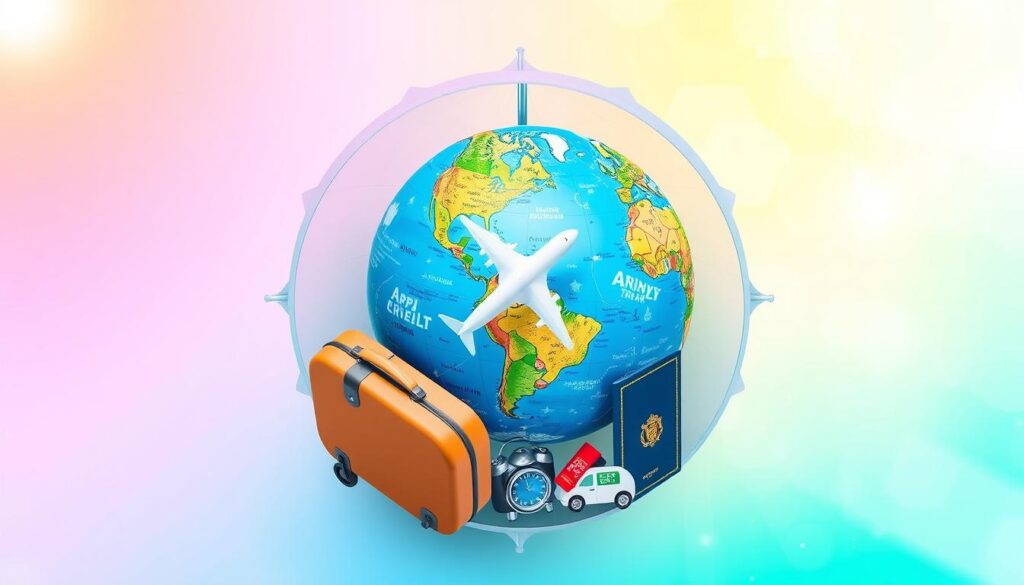
Travel insurance offers more than just reimbursement. It helps manage financial risks during your trip.
Coverage for Unexpected Fees
Your travel insurance can cover many unexpected costs:
- Trip cancellation expenses
- Medical emergency costs
- Lost baggage compensation
- Emergency transportation
“Travel insurance isn’t an expense. It’s an investment in peace of mind.” – Travel Safety Expert
Filing Claims Successfully
To get your travel fee settled through insurance, follow these steps:
- Document everything meticulously
- Understand your policy details
- Submit claims promptly
- Keep all original receipts
Proactive preparation can significantly improve your chances of successful travel expense reimbursement.
When to Seek Help for Travel Fee Settlement
Travel fee settlements can be tough to handle. Sometimes, you need expert advice to get your travel cost refund right. Knowing when to ask for help can really help solve travel fee disputes.
Consulting Customer Service
Start by reaching out to the company’s customer service. Have all your documents ready, like booking confirmations and receipts. Be clear and polite when talking to them. Some travel providers, like Sundance Vacations, have specific rules to help with fee disputes.
Utilizing Legal Assistance
Legal help is key when:
- Customer service can’t fix your issue
- The reimbursement process seems unfair
- You’re losing a lot of money
- The travel provider breaks consumer laws
Engaging with Consumer Advocacy Groups
Consumer advocacy groups can be powerful allies in travel fee settlements. They offer free or low-cost advice. They help you understand your rights and how to solve disputes. They can give:
- Free consultations
- Advice on what documents to keep
- Mediation services
- Help with complex disputes
By knowing when and how to ask for help, you can handle your travel cost refund better. You’ll be able to deal with tough reimbursement situations.
Travel Fee Settlement for Business Travelers
Managing travel costs for work trips can be tough. With 60% of business travelers finding it hard to understand travel fee policies, it’s key to have a plan for your work travel expenses.
Business travel has its own money matters that are different from personal trips. Knowing how to handle travel claims can save you both time and money.
Differentiating Business and Leisure Travel Policies
Business travel has its own rules for handling expenses:
- More complex reimbursement structures
- Stricter documentation requirements
- Company-specific spending guidelines
Handling Reimbursements through Employers
Most companies have their own ways to handle travel costs. About 70% use travel management software to make it easier.
| Expense Category | Typical Reimbursement Rate |
|---|---|
| Transportation | 40% of total expenses |
| Accommodation | 30% of total expenses |
| Meals | 15% of total expenses |
| Miscellaneous | 15% of total expenses |
To get the most out of your travel expense resolution, remember these tips:
- Keep detailed receipts for all expenses
- Submit claims quickly
- Know your company’s reimbursement policy
- Use digital submission methods, preferred by 90% of employees
“Clear documentation is the key to successful travel claims settlement” – Corporate Travel Expert
Remember, companies usually take about 14 days to process reimbursements. By staying organized and proactive, you can make managing your business travel finances easier.
Impact of COVID-19 on Travel Fees
The COVID-19 pandemic changed the travel industry’s money side a lot. It made it hard for travelers to get their money back. Airlines and hotels had to change their rules because of cancellations and safety worries.
Travel Credits and Vouchers: A New Approach
Many travel companies started giving out travel credits instead of cash refunds. These credits helped keep customers happy while the companies saved money.
- Extended voucher validity periods
- No-penalty rebooking options
- Transferable credit systems
Transformative Changes in Airline and Accommodation Fees
The pandemic changed how airlines and hotels charge for things. Airlines made it easier to cancel trips. Hotels started charging more for cleaning and added safety steps.
| Fee Category | Pre-Pandemic | Post-Pandemic |
|---|---|---|
| Cancellation Fees | Strict penalties | More flexible options |
| Cleaning Fees | Standard rates | Increased to cover enhanced sanitization |
| Rebooking Charges | High change fees | Reduced or waived |
“Flexibility became the new currency in travel during the pandemic” – Travel Industry Analyst
Travelers need to stay alert and know about these fee changes. This helps them get the most out of their travel money and deal with the new rules.
Staying Informed About Travel Fee Changes
Travel expenses can be tricky to manage. Knowing about travel fee reimbursement is key. Keeping up with industry changes is the first step in handling travel costs.
Smart travelers keep an eye on financial updates. Tracking fee changes can save you money and avoid surprises.
Following Reputable Travel Blogs
Keeping up with travel trends is easy. Here are some top tips for staying informed:
- Follow popular travel blogs for industry insights
- Read expert commentary on travel fee trends
- Look for blogs with real-world traveler experiences
Maximizing Airline Newsletter Subscriptions
Airline newsletters are great for travelers. They offer:
- Early alerts on fee changes
- Exclusive discount alerts
- Policy updates before they affect your travel
Leveraging Frequent Traveler Programs
Joining frequent traveler programs is more than just earning points. They offer:
| Program Benefit | Traveler Advantage |
|---|---|
| Priority Notifications | Immediate updates on fee changes |
| Insider Information | Advanced knowledge of travel cost settlement strategies |
| Exclusive Resources | Access to specialized travel financial guidance |
“Knowledge is the most valuable travel companion you can have.”
By using these strategies, you’ll become a savvy traveler. You’ll stay ahead of travel fee changes and avoid unexpected costs.
Frequently Asked Questions About Travel Fee Settlement
Travel fee settlement can be tricky, but knowing about travel expense reimbursement is key. It helps travelers understand their financial situation better. Many travelers have questions about how to document and get back their travel costs.
The process of settling travel fees depends on a few important things. You’ll need to collect all your travel documents, like original receipts and booking confirmations. The best claims have clear, detailed records of your expenses.
What Documentations Are Required?
Make sure you have all your travel documents ready. You’ll need original receipts, credit card statements, and booking confirmations. Also, keep travel itineraries and any letters from airlines or travel companies. Having digital scans helps keep your documents safe for future use.
How Long Does Settlement Take?
How long it takes to settle your claim varies. It usually takes 30-45 days for most claims. If you have all your documents ready and communicate well with the service provider, it might be faster.
Can I Appeal a Denied Fee?
If your travel fee claim is denied, you can appeal. First, understand why it was denied. Then, gather more evidence and write a formal appeal. Many companies have appeal processes that let you challenge the decision and possibly get your money back.

